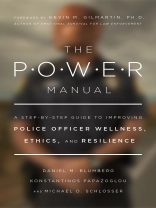This book presents a research-based approach to comprehensive wellness for members of law enforcement. It offers personal and professional steps officers can take to optimize mental health, maintain commitment to the noble cause, and build resilience for the daily challenges of police work. Chapters focus on achieving and maintaining balance in physical, cognitive, emotional, social, and spiritual areas. Readers will learn a proactive approach to handling adversity and will have accessible tools for restoring wellness when things go wrong.
Содержание
Foreword by Kevin M. Gilmartin, Ph D
Introduction: Achieving Balance
Part I. Wellness
Chapter 1. Physical Health
Chapter 2. Cognitive Wellness
Chapter 3. Emotional Wellness
Chapter 4. Social Wellness
Chapter 5. Spiritual Wellness
Part II. Ethics
Chapter 6. Commitment to the Noble Cause
Chapter 7. The Guardian Spirit of Policing
Chapter 8. Moral Distress and Ethical Exhaustion
Part III. Resilience
Chapter 9. Stress Inoculation
Chapter 10. Growth Through Adversity
Chapter 11. Self-Compassion & Positive Psychology
Chapter 12. Closing Thoughts: Maintaining Balance
References
Additional Resources
About the Authors
Об авторе
Daniel M. Blumberg, Ph D, is a licensed clinical psychologist who has spent the past 3 decades providing clinical and consulting services to local, state, and federal law enforcement agencies. His areas of expertise include workplace stress prevention and trauma recovery, as well as the selection, training, and supervision of undercover operatives. His research interests include police integrity, the moral risks of policing, and programs to improve relations between the police and the community. He is the director of The POWER Project (policepowerproject.org), a training and consultation public benefit corporation for law enforcement.
Konstantinos Papazoglou, Ph D, is the founder and director of Pro Wellness Inc., a mental health service provider group based in Toronto, Canada. He is also the principal founder of The POWER Project (policepowerproject.org), which provides evidence- and practice-based educational and consulting services on police wellness, ethics, and resilience. With a background in providing clinical assessment and treatment to criminal justice offenders, he is now involved in community policing and trauma-focused programs that support victims of violent crimes. He is an affiliated researcher with the Loss, Trauma, and Emotion Lab at Teachers College, Columbia University. His research work focuses on stress, trauma, and resilience promotion among police officers.
Michael D. Schlosser, Ph D, is director of the University of Illinois Police Training Institute. He retired as a lieutenant from the Rantoul, Illinois Police Department in 2004. Dr. Schlosser has conducted and collaborated in cross-disciplinary research projects at the University of Illinois and is credited for his innovative ideas toward police reform. He has authored dozens of articles, made media appearances, and given over 100 presentations across the country on topics such as police tactics, police training, use of force, de-escalation techniques, control and arrest tactics, the intersection of police and race, diversity, police officer wellness, and police family wellness.












